| Reviews & Columns |
|
Reviews DVD TV on DVD Blu-ray 4K UHD International DVDs In Theaters Reviews by Studio Video Games Features Collector Series DVDs Easter Egg Database Interviews DVD Talk Radio Feature Articles Columns Anime Talk DVD Savant Horror DVDs The M.O.D. Squad Art House HD Talk Silent DVD
|
DVD Talk Forum |
|
|
| Resources |
|
DVD Price Search Customer Service #'s RCE Info Links |
|
Columns
|
|
|
Loved One (Warner Archive Collection), The
Hilarious, but scattershot--and in the end, superficial--satire. Warner Bros.' Archive Collection line of hard-to-find library and cult titles continues to cannibalize their mainstream WB disc back catalog with the release of The Loved One, the 1965 black comedy from Filmways (released by Metro-Goldwyn-Mayer) about the funeral business (...and much more), based on Evelyn Waugh's slim novelette, written by Terry Southern and Christopher Isherwood, directed by Tony Richardson, and starring Robert Morse, Jonathan Winters, Anjanette Comer, Dana Andrews, Milton Berle, James Coburn, John Gielgud, Tab Hunter, Margaret Leighton, Liberace, Roddy McDowall, Robert Morley, Barbara Nichols, Paul Williams, and Lionel Stander ("Incrapitible!"). Advertised as "the motion picture with something to offend everyone," The Loved One works best as a string of sick jokes about life's three greatest pleasures--sex, food, and death--but you couldn't remotely suggest it has a cohesive statement to make, or an overall sustained effect, either. The same extras--a nice mini-doc and the original trailer--are included from the 2006 disc release, for this razor-sharp anamorphically-enhanced widescreen black and white transfer.
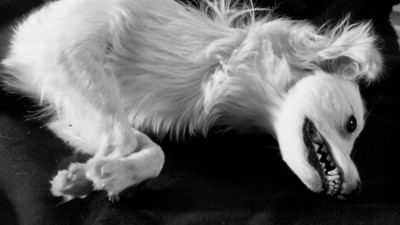
Would-be British poet Dennis Barlow (Robert Morse), having won a free airline ticket (to either Los Angeles or Calcutta), decides on the spur of the moment to visit his distant uncle, Sir Francis Hinsley (John Gielgud), who has worked as a production designer for 31 years at Megalopolitan Pictures in Hollywood. Sir Francis' latest assignment, courtesy of nervous, hustling producer Henry Glenworthy (Jonathan Winters) and cold, devious studio production head D.J., Jr. (Roddy McDowall), is to transform cowboy movie star Dusty Acres (Robert Easton) into an English secret agent ("We give him the one thing Jim Bond don't have...human warmth. Phew!"). Sir Francis is gracious to his unexpected house guest, but when he's unceremoniously fired from the studio, he hangs himself over his empty, decrepit swimming pool. Imperious, fatuous Sir Ambrose Ambercrombie (Robert Morley), the unofficial head of the expatriate Brits in Hollywood, bullies Dennis to sell Sir Francis' Beverly Hills bungalow to pay for an expensive funeral at the celebrated Whispering Glades cemetery complex, in order to mitigate the perceived scandal. Heading out to the Disneyland-like Whispering Glades, Dennis meets and immediately lusts after "Gothic Slumber Room" cosmetician Aimee Thanatogenous (Anjanette Comer), a dimwitted "true believer" in the pricey mumbo-jumbo death cult foisted by Whispering Glades's charismatic/crass businessman founder, Reverend Wilbur Glenworthy (Jonathan Winters). Dennis, however, has a rival for her affections: head mortician Mr. Joyboy (Rod Steiger), an effete, mincing barbell boy with a very heavy mother fixation on his very heavy mother, Mrs. Joyboy (Ayllene Gibbons). While Aimee waits for newspaper advice columnist "The Guru Brahmin," a.k.a. drunken writer Hump (Lionel Stander), to tell her who to marry, Henry Glenworthy, also fired from Megalopolitan, begs for a job from his brother the Reverend, who puts him in charge of one of the Reverend's embarrassing little money-makers: The Happier Hunting Grounds pet cemetery. There, Dennis gets a job, as well, disposing of animal "loved ones," while he cribs poems from classical authors to impress frigid dumbbell Aimee. Henry's befriending of junior rocket scientist Gunther Fry (Paul Williams) neatly dovetails with brother Wilbur's big, big problem: what to do with all those now-inconvenient stiffs on his increasingly valuable cemetery real estate?
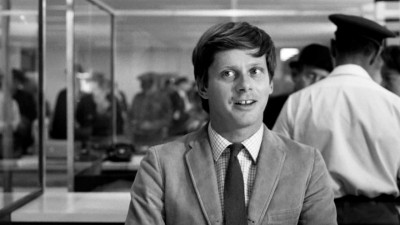
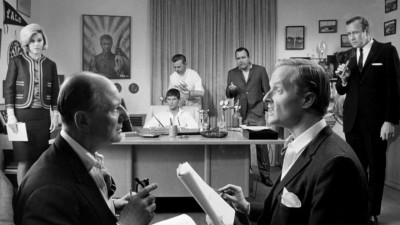
Reading reviews past and present for 1965's The Loved One ("then" = most critics unconditionally disliking it; "now" = too many reviewers unconditionally liking it), there does seem to be a common thread running through many of them of a varied degree of lament, that the movie isn't quite up to snuff (sorry, couldn't help it), with supporters making excuses for the movie's unmistakable lapses, and critics making excuses for the undeniable laughs. The older critics deemed it either distastefully worthless or fitfully funny and worthless, while newcomers to it seem to give it more credit for faking-out the clueless 1965 critics, rather than for the pertinence (or even potency) of its satirical jabs. Staunch defenders of the movie cite its jerry-rigged construction as a deliberate expression of "New Wave" moviemaking techniques...without really addressing the unfortunate dilution of the satire (owing to director Richardson's too-scattershot aim), while past critics of the movie acknowledged that some of the comedy worked, but not for long...and none of it tastefully. Instead of its infamous promotional tag line, "the motion picture with something to offend everyone," maybe The Loved One's poster should have read, "the motion picture with something to vaguely dissatisfy everyone."
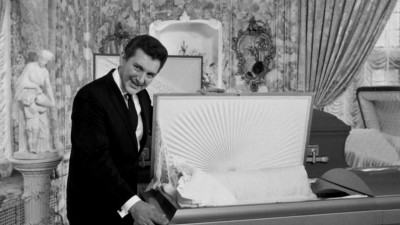
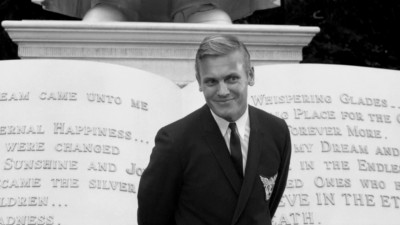
I've always found the funniest joke in the feature film version of The Loved One is the one that can be discerned off-screen: a satirical adaptation of satirist Waugh's novelette, committed by post-modern, rebellious filmmakers the conservative author probably couldn't stand, significantly alters the novel in a manner sure to disgust the original author...who wrote the novel in feigned disgust in the first place. The irony of the seriously conflicted Waugh--Waugh the effete, the Catholic aesthetic, the idle wastrel, the commando-trained WWII intelligence officer, the would-be aristocrat, the suicidal drug-taker, the waspish, acid-tongued satirist, the foe of Modernism--by 1965 a deeply conservative, deeply religious Catholic traditionalist, his work "celebrated" by the very people he most probably hated in 1965...this irony is doubled by the fact that Waugh was the epitome of the caricatured elitist snob who would fit right in this movie. The incorrect version of the story surrounding Waugh's inspiration for writing The Loved One--undertaken after a so-called "discouraging" 1947 trip to Hollywood to negotiate with M-G-M to film Brideshead Revisited--is often referenced in the movie reviews, when just the opposite was true: Waugh, with absolutely no intention of letting the boorish Americans adapt his novel, was bilking Hollywood for a paid 2K-a-week trip to America under the guise of "negotiating," (Waugh hated America more than Terry Southern, Christopher Isherwood, or Tony Richardson ever did).
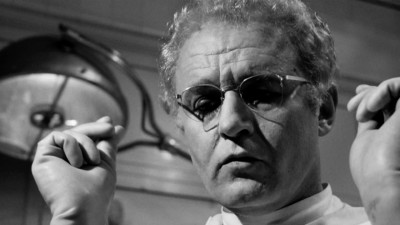
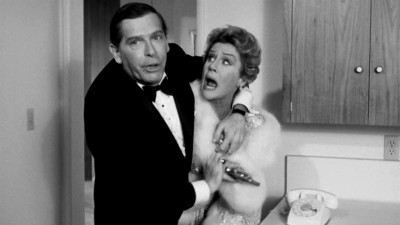
I mention all of this because there's a hole in the middle of the filmed The Loved One, and that hole is Waugh, much of whose work is often at least semi-autobiographical. The movie's satire needed an anchor, a viewpoint; it needed Waugh's stand-in character, Dennis, to either comment in some way on the lunacy around him, or he needed to be a central gag figure who was skewered just as smartly, if not more so, than the various targets around him. As scripted by Southern and Isherwood, and as blandly played by Morse, the Dennis character is not a representation of the coming counterculture (despite some critics who charge so, in an effort to say the movie is "even-handed" in its satirizing); a Beatles haircut alone doesn't cut it. Instead, the character vaguely plays like just a new generation of the opportunistic British ex-pats, such as Sir Ambrose Ambercrombie, who come to America looking for easy scores...like Aimee. There's little more to the character than that; we don't know why he does anything, really, in the movie. Why does he want Aimee? What does he see in her, except wanting to sleep with her? It's a small, even tiny point, but it's a critical one that nags at the back of the viewer's mind: why does Dennis meekly go along with Sir Ambrose Ambercrombie's command that he sell the cottage to pay for his uncle's funeral? If he's so enamored with money--he's willing to live off Aimee's salary; he blackmails Mr. Joyboy for every cent he has--wouldn't he just keep the money left to him by an uncle he doesn't really know? Flatly stating that Dennis' various admittedly funny encounters alone constitutes "satire" just because they're funny, misses the point of satire: you need a viewpoint. And without that core from which to spring the jabs at church and mother and death, The Loved One flies all around, hitting joke after funny, sick joke with regularity, admittedly...but with little context, little point, and at the end, very little real impact.
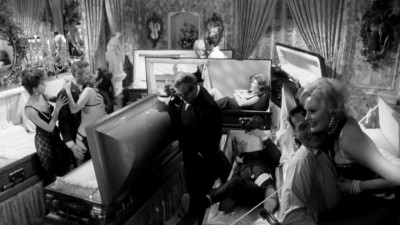
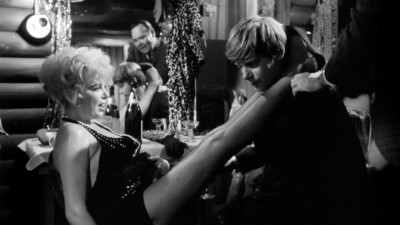
I guess that shouldn't be too surprising, though, when you see the principle author of the piece, Terry Southern (my understanding is that Isherwood's contribution came early on, and was then "doctored" by Southern), indicating the true depth of his satirical bite by leaving out of The Loved One the one Hollywood caricature that hits closest to him in 1965: the jet-setting, newly-rich, married-with-children screenwriter paid hundreds of thousands of dollars to patch-up crappy movies while he swings with his girlfriend and celebrity friends in Malibu, all the time cashing those big, beautiful capitalist Hollywood studio checks...for writing a savage expose of those same Hollywood studios. Robbed of half of Waugh's original subject matter, anyway--having the story take place in 1965, the notion of ribbing ex-pat Britishers in Hollywood as the novel does, makes no sense here; guys like Colman and C. Aubrey Smith and Niven were either dead or long-gone from the Hollywood "scene" at this point--Southern can only stick Hollywood and the funeral business here, throwing out admittedly hilarious one-liners and gross-out slapstick, but without much rhyme or reason (Southern, a brilliant, funny writer, had far more scripts, proposed scripts, and doctored scripts that didn't work, compared to the two or three iconic ones he contributed to--Dr. Strangelove, Easy Rider--that did).
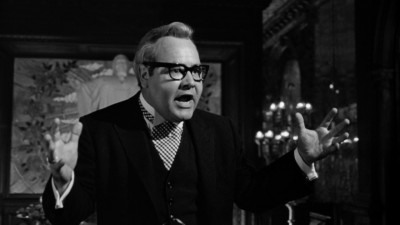
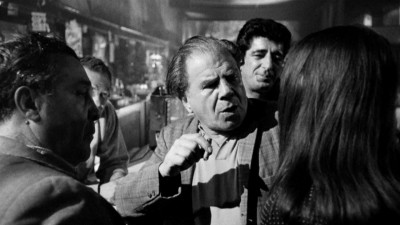
Then again...maybe it was Richardson's take on that screenplay that diffuses The Loved One (did Tom Jones's fluke international success in 1963, the movie that got The Loved One for Richardson, mark the apex of his career? Look at his filmography before and after Jones, and you tell me...). Whether it was Richardson's peripatetic "New Wave" jump-cutting, courtesy of Tony Gibbs, stretched out far too long at 122 minutes, or Southern's superficial, easy-target riffing, The Loved One jokes "kill" over and over again...but the target doesn't die. The first third of the movie, focusing largely on Gielgud's efforts to polish Dusty Acres into a British secret agent, is the movie's most tightly observed. From the laugh-out-loud one-liners at the commissary scene (Morse and Gielgud order the "Deep Dish Lolita," "Breast of Squab Brigitte," and a "Goldwater Nut Flip"), to the thinly veiled--although nobody ever seems to mention it--take-off on the creepy father/son dynamic of Fox's Darryl and Richard Zanuck (DJ = DZ), right down to McDowall's inspired look of awe and terror when Daddy calls on the phone (all of McDowall's "yes" men laugh at one of his jokes they couldn't hear), these studio scenes are brilliantly cold and cutting...and enormously funny to devotees of behind-the-scenes Hollywood (I love it when oblivious star Easton won't move his legs for lowly Gielgud, making Gielgud step delicately over him).
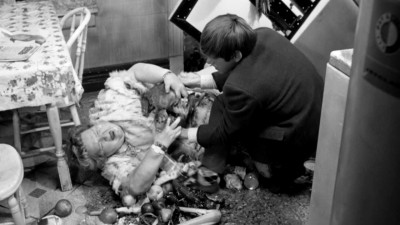
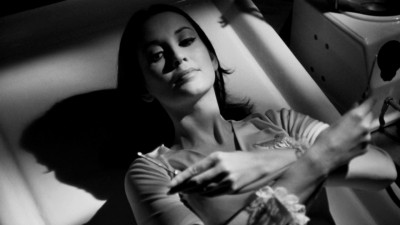
The middle section bogs down whenever it focuses too long on Morse and Comer's not-funny-enough courtship (only Stander's presence saves this element of the movie--that "Guru Brahmin" 8x10 is worth admission alone--his beautifully scuzzy performance may get the loudest belly-laughs here). However, this second act scores the movie's biggest laughs, in the best tradition of early Mad Magazine and the "sick" humor movement of the late 1950s, when we see the goings-on at Whispering Glades and The Happier Hunting Ground, or whenever Steiger's transcendently grotesque Mr. Joyboy and his equally repulsive Mom are around. Fully-in-the-know Liberace is perfectly cast as a ghoulish casket seller who sniffs snobbishly at Morse's thriftier notions ("Water, moisture, and dampness-proof"), while completely unaware, washed-up Tab Hunter is perfectly cast as a cruel in-joke: an insincere, robotically-programmed cemetery tour guide. Gielgud makes a welcome return after Richardson's poorly-staged exiting of his character, delightfully grossing out the viewer with an absolutely hysterical set of post-mortem "faces" put on by Mr. Joyboy. And Milton Berle and Margaret Leighton--an inspired pairing--are letter-perfect in a repulsive burlesque concerning Leighton's hysterical emotionalism when her pet dog dies (the only thing funnier--and sicker--than Leighton painfully slapping Berle's face, "You filthy swine!" before immediately following with a sobbed, "Why must you always hurt me?" is Richardson's disgusting shot of a real-life dead dog on the breakfast bar). As for dyed, curly-haired Steiger, his Gorgeous George-inspired Mr. Joyboy, all sweaty muscles and barbells and men's magazines lying around, it's a comedic performance so inspired, so weirdly...otherworldly, that's it's a complete original: I've never seen anything like it, or imitative of it, since. Richardson and his editor, Tony Gibbs, achieve a level of vile, repellant nausea that even John Waters would envy in those scenes featuring Ayllene Gibbons as "Mom" Joyboy, gnashing her teeth as she orgasmically repeats, "Oh, God! Oh, God! Oh, God!" when her favorite food brand airs a new commercial. That Richardson could achieve such a heightened state of both perverted hilarity and stomach-churning repugnancy, is some kind of credit he should receive, regardless of The Loved One's final shaking-out (the topper, no doubt supplied by Southern?--as Steiger escorts Comer out of Mrs. Joyboy's nightmarish eating bedroom/hog trough, he giggles, "Mom's a heckavalot of fun, isn't she?")
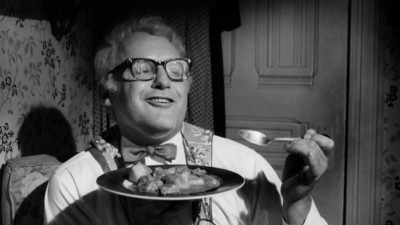
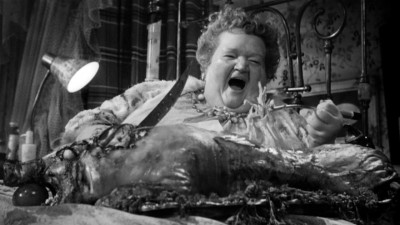
The final third of The Loved One unfortunately doesn't match the intensity of the middle act, with the plot mechanics starting to take over from the satire (what to do with the stiffs: shoot them into space), while a general air of frenetic screeching over tired subject matter (Southern's seen-it-before military spoofing) inflates the running time while trying the viewer's patience. All of this feels arbitrarily dragged in (it ain't in Waugh) to give the movie a "big send-off," while Jonathan Winters, who impressed when he was the quietly-menacing Reverend, goes over the deep end, hamming it up something awful during his near-rape scene of Comer. The big finale may end with a rocket shooting into space, but it feels like a damp fizzle (bizarrely, Richardson has Morse removed from the scene, watching it on television at the airport, further distancing our involvement with it), leaving the viewer with a distinctly bummed-out, anti-climatic feeling. Sure we can get the giggles again, remembering Mr. Joyboy sending a hideously surprised-looking corpse down to Aimee with a note that states, "This is how I feel since I heard of your betrothal," or maybe one of Southern's one-liners that got past the censors ("She swallowed it: hook, line, and pole!" Winters crows after Morse lets blowsy stripper widow Barbara Nichols eat him alive). But there's no mistaking a comedy that doesn't know how to send its audience out laughing, and Winters, tiny on a TV screen, yelling, "Resurrection now!" as a rocket blasts off, just doesn't do it. Most of The Loved One's gags worked...but the satire died.
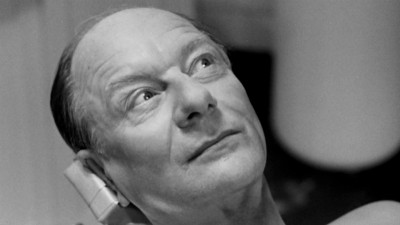
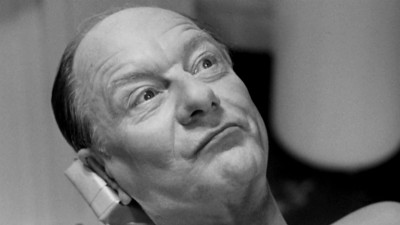
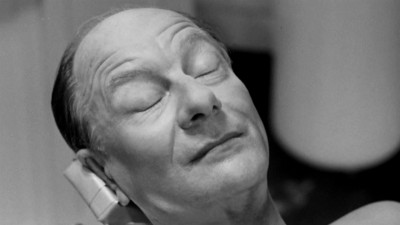
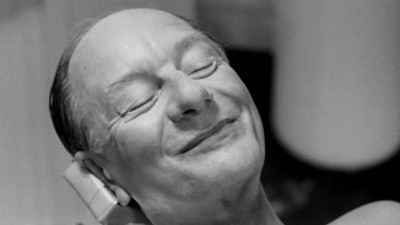
The DVD:
The Video:
The anamorphically-enhanced, 1.85:1 black and white widescreen transfer for The Loved One looks quite crisp, with a sharp image and a bluish, cold, black and white tone. Nice.
The Audio:
The Dolby Digital English mono audio track is clean (if a little low), with little hiss. There are also English, French, and Spanish subtitles available--all clear indicators that this isn't a true bare-bones Archive Collection offering, but just a dusted off mainstream WB re-release.
The Extras:
A 15 minute documentary from the 2006 disc(when the studios routinely did these extras for even marginal titles) is included, featuring interviews with Morse, Comer, and Wexler, where the movie is discussed. The original trailer is included, as well.
Final Thoughts:
The site of Rod Steiger's Mr. Joyboy alone is enough to highly recommend The Loved One. Sick gags and hilarious one-liners abound in this reasonably tasteless black comedy...but there's no hiding the fact that the movie isn't really about anything very deep, going for cheap (but hysterical) laughs instead of truly biting satire. Still...those jokes are "incrapitible!" I'm highly recommending The Loved One.
Paul Mavis is an internationally published movie and television historian, a member of the Online Film Critics Society, and the author of The Espionage Filmography.


|
| Popular Reviews |
| Sponsored Links |
|
|
| Sponsored Links |
|
|
| Release List | Reviews | Shop | Newsletter | Forum | DVD Giveaways | Blu-Ray | Advertise |
|
Copyright 2024 DVDTalk.com All Rights Reserved. Legal Info, Privacy Policy, Terms of Use,
Manage Preferences,
Your Privacy Choices | |||||||













